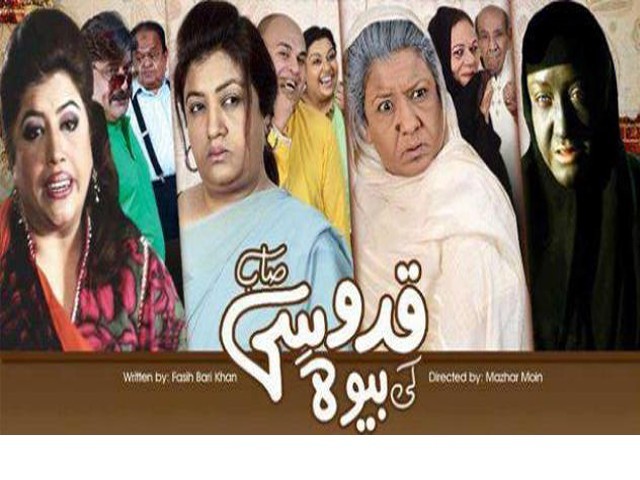
They say good laughter is a form of internal jogging, so when was the last time you laughed out really hard? You know, the uncontrollable, hearty kind of laughter that leaves you appreciating the object that triggered it? Yup, that kind.
I laugh out loud every time I watch ARY Digital’s drama serial Quddusi Sahab Ki Bewah. Though many people I know are quite skeptical about the authentic humour it contains, I admire it for the realistic portrayal of events that the socio-economically lower class witness in their everyday lives.
Quddusi Sahab Ki Bewah is a comedy drama serial which aired for the first time in 2012, on ARY Digital. Just after its first premier, it became an enormous success among those who turn on their televisions for light-hearted dosage of laughter.
There are multiple reasons behind the massive success of this serial:
An inimitable story line:
This drama serial has a unique story line which is entirely different from what we usually see in Pakistani dramas.
It is written as a follow-up series to the popular telefilms by Fasih Bari Khan; he usually manages to write stories really well.
Plot outline:
The drama serial is based on a story of two families that share a house; one family resides on the ground floor, while the other one lives upstairs.
The landlord is Aleemuddin, who lives upstairs with his family. His family comprises his wife Nanhi, a divorced daughter Bhunarya, a son Maqsood and a daughter-in-law Rooh Afza.
Aleemuddin’s senility never gets in the way of his flirting. He loves to hit on the neighbours’ daughter and has even married the youngest one!
The widow of Quddusi Sahab, Shakooran begum lives downstairs as a tenant with her three daughters, Badriqa Jahan, Khajasta Jahan, Shagufta Jahan and a son Wudood Ahmad.

(The very effeminate Wudood Ahmad, son of Shakooran)
Aqeela bhabhi who portrays the character of a gossipy bee jamalo is their neighbour and a good friend of Shakooran.

(The “Amma” (Shakooran Begum), known for her generous use of archaic Urdu proverbs)
Shakooran likes to keep an eye on her daughters because they’re all boy-crazy. She often bribes Aqeela Bhabi to spy on her daughters.

(Shakooran’s shy daughter, Badriqa Jahan, who is a principal at a government school)
Saturated amalgamation of Urdu language:
This is the prime reason for my admiration of this brilliantly scripted serial. It takes you back to the old days when every character in our drama serials was scripted in saqeel (difficult) Urdu, that represented the simplicity and modesty of Pakistani culture.
This serial was able to move many hearts by conveying our national language in its original form.
Picture-perfect direction:
Quddusi Sahab Ki Bewah is directed by Mazhar Moin who is famous for his work – examples of Mazhar Moin’s excellent direction include Shakoor Sahab, Saray Ghat Ki Farzana, Bawli Bitiya, Pichhal Periyan, Ronak Jahan Ka Nafsiyati Gharaana and Burns Road Ki Nilofer. I recommend you watch all of these dramas!
One woman show:
Hina Dilpazir’s phenomenal performance takes the cake. Her work in this particular drama serial is worthy of applause. Watching her switch multiple roles is hilarious. The way she plays the role of women of every age and mindset is absolutely amazing! Sometimes viewers forget that it is the same person playing so many characters.
She plays Shakuran Begum, Badraka Jahan, Rooh Afza, Bengali baji, Nazima Khatoon (Aleemuddin’s sister), Nazeer Khan (clumsy/ill-mannered street rat), Tina Gul (Rooh Afza’s mother), Elaichi (a transgender) and Tamizini.
Out of all the roles that she plays, the role of Rooh Afza stands out. She represents the attitude of a woman who feels young at heart and is full of self flattery. Her best-friend is the neighbour’s son Wudood Ahmad, and they often indulge in sessions of fashion and make-up talk.

(The neighbours’ daughter-in-law, Rooh-Afza, a gawdy self-proclaimed “glamour girl”)
Despite her poor English language skills, she is able to speak in English confidently and loves to gossip.
Other actors like Shahnaz Pervaiz (Khajusta Jahan), Hassan Ali (Safaid aadmi), Uroosa Siddique (Shagufta Jahan), Maqsood Bhai (Maqsood), Waqar Hussain (wadood), Ubaida Ansari (Nanhi), Hira Sheikh (Bhunarya), Badar Khalil (Aqeela Bhabi), Mirza Shahi (Aleemuddin Sahab) and Sajal Ali (Farzana) add to the on-screen madness.
Each of the characters play their role to the fullest. The drama has me laughing till my stomach hurts every Sunday. It’s a must watch!
by ---

Rakshinda Mujeeb
Researcher by profession, writer by choice. She also works as a content writer for an NGO. She enjoys the impact her articles have on readers.
 RSS Feed
RSS Feed Twitter
Twitter










0 comments:
Post a Comment